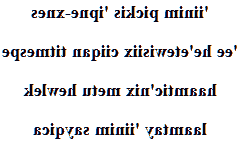Nez Perce love poem
'ipne-xnes
'iinim pickis 'ipne-xnes
'ee he'etewisiix ciiqan titmespe
Haamtic'nix metu hewlek
Laamtay 'iinim sayqica


→ French poem ←
Niimi'ipuutímt language
Here my love poem translated into Nez Perce (Downriver, Upriver, Autonym : Niimi’ipuutímt, Niimíipu, Nuumiipuutimt), the sahaptian language of Nez-Percés people (name given by the French in the 18th).
There are two Niimi’ipuutímt dialects, that of the group further upstream of the Snake River, and that of the group further downstream, in eastern Washington and Idaho. The upriver dialect is spoken by some elders in Kamiah and Lapwai (Idaho), and by others in Colville (Washington). The other dialect, the downriver dialect, has a few speakers in Umatilla (Oregon) (usually Cayuses who adopted the Nez Perce in the 19th century), and a few others who have less command of the language in Idaho.
This translation of my verses, come from amiah in Idaho, the translator is Nimíipuu. They are less than 500 to speak it. Niimi'ipuutímt is an endangered language. There not a lot of fluent speakers, but this language has a revitalization program.
The Nez Percés
The Nez Percés lived in an area that partially corresponds to the states of Idaho, Washington and Oregon.
Their social organization based on the association of local groups and the existence of independent bands. These groups were led by a hereditary chief, assisted by a council of elders and warriors, who could contest the hereditary transference.
The gold of their subsoil was fatal to their culture. Today they are about 3,000, in the reserves of Idaho and Washington State.
Smohalla (1815-1895) Nez Percé Indian "The Dreamers":
My young men shall never work,
Men who work cannot dream; and wisdom comes to us in dreams.
You ask me to plow the ground. Shall I take a knife and tear my mother’s breast?
Then when I die she will not take me to her bosom to rest.
Navajo